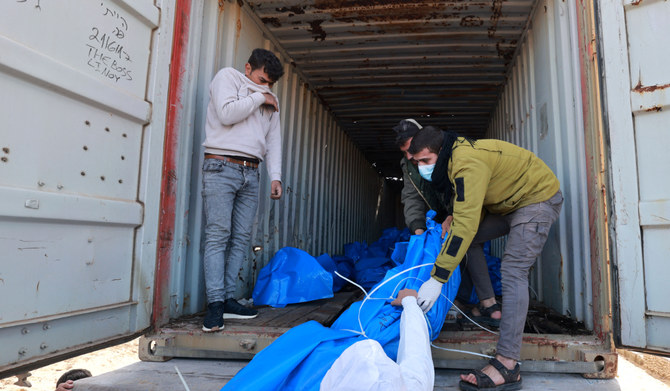BEIRUT: Lebanese President Joseph Aoun called on the UNHCR’s commissioner, Filippo Grandi, to “start organizing return convoys for the displaced Syrians in Lebanon.”
Aoun said Lebanon “can no longer support the burden resulting from their presence at different levels.”
He called on the international community to provide material and humanitarian support to achieve the return of displaced Syrians.
Some countries have already started their support, he added.
Grandi visited Aoun at the Presidential Palace to congratulate him on his election.
During the meeting, the president affirmed that Lebanon “wants the return of Syrian refugees to their country as soon as possible, especially since the reasons for their displacement no longer exist.”
Aoun, who also met with Prime Minister-designate Nawaf Salam, tackled the infiltration of several Syrians into Lebanon following the developments in the neighboring country.
He emphasized “the importance of working to stop infiltration on both sides of the Lebanese-Syrian border.”
Citing UNHCR estimations, Grandi said that more than 200,000 displaced Syrians had returned to their country from Lebanon, Syria, Jordan, and other countries since the fall of the former Syrian regime on Dec. 8.
Many others also wish to return home, he added.
He added that a survey conducted by the UNHCR showed that the number of those wishing to return had increased from about 1 percent to 30 percent in a matter of weeks.
Grandi affirmed that the UNHCR was “supporting those who returned and that we have already started doing so.”
He said the UNHCR’s relationship with the new authorities across Syria was constructive, and they had started prioritizing the issue.
Grandi said UNHCR wanted to work with Lebanon to build a practical way to support the return of Syrians.
To achieve this, the president can play a vital role with the international community, he added.
After the meeting Grandi explained that his visits to Lebanon, Syria, Jordan, and Turkiye aim to “discuss the issue of Syrian refugees, particularly in light of recent political changes in Syria.
“We believe that these changes may allow refugees to return to their home country and leave their host nations, including Lebanon, which has hosted them with great generosity and patience for nearly 14 years.”
He added: “During the most recent war in Lebanon, between September and October, over 450,000 Syrian refugees returned to Syria.
“We believe that, with the return of this significant number of Syrian refugees, sustained support is crucial to ensure their permanent return.
“Therefore, we began implementing a program designed to support returnees from different countries by offering material assistance and other means of support.
“Material support is essential, as well as efforts to restore life in the areas where refugees are resettling,” he said.
“Otherwise, they will leave again, most probably to their host countries.
“It is important to note that the new Syrian authorities have welcomed the Syrian refugees back, which is a positive sign,” Grandi said.
“However, the new authorities must stay on course — respecting minorities, preserving the rights of all citizens, and lifting Syria to new horizons that rebuild trust among Syrians, including returning refugees,” he added.
Grandi held talks as Lebanese military authorities prepared for the withdrawal of Israeli forces following their incursion into southern Lebanon since Oct. 1. The 60-day stage of the ceasefire deal is set to expire at dawn on Sunday.
In a meeting with acting Lebanese Army Commander Maj.-Gen. Hassan Odeh, caretaker Defense Minister Maurice Slim underlined Lebanon’s “firm commitment to the withdrawal of the Israeli forces within the agreed deadline in the ceasefire agreement.”
Slim’s office stated that the discussion focused on the deployment of the Lebanese Army in all the areas from which the Israeli forces would withdraw.
Slim said the army was ready to be deployed in throughout the region.
The Lebanese Army entered the border town of Kafr Shuba in the eastern sector.
Units had been stationed on the outskirts of the town, facing Al-Sammaqa, an Israeli military site.
Other units have been deployed in Hanin, where Civil Defense teams recovered the bodies of several Hezbollah fighters.
Also on Saturday, the Israeli military destroyed rest facilities on the banks of the Wazzani River, and eight houses in the town of Taybeh were deliberately burned.
Video footage was taken by dozens of residents returning to their villages after the Lebanese Army deployed there, showing the extent of the destruction of property and facilities, especially in the town of Khiyam.
The Israeli military claimed that “forces of the 810th Brigade, operating under the command of the 210th Division, found and seized a large number of weapons in the Shebaa Farms, including anti-tank launchers, rocket launchers, machine guns, binoculars, and rockets aimed at Israeli territory.”
In a statement, the Israeli military said that “the forces of the 7th Brigade, operating under the command of the 91st Division, are continuing their activities in southern Lebanon to protect Israel's security.”
It claimed that “they are operating under the understandings reached between Israel and Lebanon while maintaining compliance with the conditions of the ceasefire agreement.”
Israel’s outgoing ambassador to the US, Michael Herzog, claimed that talks were being held with the administration of President Donald Trump to extend the withdrawal date from Lebanon scheduled for next Sunday.
The Trump administration is pressuring Israel to withdraw from Lebanon in accordance with the scheduled date on Sunday, the Israeli Army Radio reported.




























